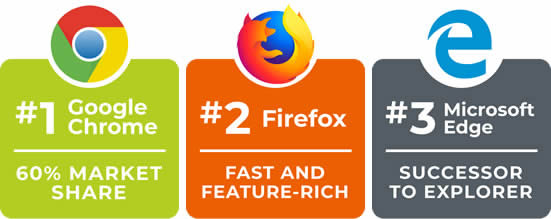Breaking Up with Internet Explorer
Some relationships last far longer than they should. You may be staying because things are easy . . . comfortable. You’ve been with them so long, you’re not sure what you would do without them. But in the back of your mind, you know things aren’t working. Your needs aren’t being met.
I’m here to tell you that there are better options out there for you. You don’t have to settle for Internet Explorer.
In April of 2018, it was reported that a hacking group was using a vulnerability in Internet Explorer to infect Windows PCs with malware that had the potential to allow the hacker to remotely control the computer. Microsoft didn’t immediately respond with a patch for Internet Explorer. They did, however, offer this: “We recommend customers use Windows 10 and the Microsoft Edge browser for the best protection.”
That’s the equivalent of having your significant other’s parents tell you that you should be dating someone else. Someone younger and better looking. But there are good reasons why Microsoft has all but abandoned its once-golden child.
The history you have together
In 2003 Internet Explorer was the most popular browser with a 95% market share. It shipped with every PC running Windows and was its default browser. And it had relatively little competition. However, it never had a stellar reputation, as It was plagued with bugs and vulnerabilities over its various versions.
As a result of competition from newer, better browsers, today the percentage of people using IE has dropped to 3.04% worldwide. While IE11, the last version of Internet Explorer, still ships with Windows 10 due to legacy web apps that rely on it, the default browser is Microsoft Edge. IE is officially discontinued, with only IE11 receiving regular security patches when necessary. Other versions of IE are not supported by Microsoft.
Why the honeymoon is over
If you’re still using Internet Explorer for general web browsing, you’re possibly leaving yourself vulnerable to attack. Hackers love to uncover flaws in browsers like IE, because they’re only marginally supported and have a long history of exploits to start from. And because IE is tied closely to the Windows operating system, allowing background processes that other browsers don’t, it’s often called the most vulnerable browser.
Another drawback with using Explorer is how it displays websites. You may notice while browsing sites in IE that things don’t look like they do in more modern browsers. Photos may be cut off, text might run into areas it shouldn’t and some site functions might not work at all. This is because as time passes, the way in which websites are coded changes. Since IE isn’t being updated to understand new coding techniques, it draws web pages onscreen based on what it does know. This leads to mistakes that can ruin the viewer’s experience. Web developers are faced with either not supporting IE, or including additional code just so Explorer displays sites as intended. Since this increases development costs, sites that support IE will continue to decrease.
Finally, Internet Explorer is much slower compared to other browsers, sometimes up to 30% slower on some sites. This makes general browsing frustrating and decreases your productivity if you’re using Explorer for work. Browsers such as Chrome and Firefox are continually updated to keep up with the increasing demands of websites, leading to a much better user experience.
There are a lot of fish in the virtual sea
If you’re working in a company where your only option is Explorer, or you’re just a long-time user out of habit, you may not have any idea about what you should be using instead. Here are some serious contenders for your affection.

Chrome is the current leader in terms of browser usage, with almost 60% market share. It’s fast, lightweight, easy to use, and can add third-party extensions, increasing the browser’s capabilities. It’s available on all major platforms, which means you can use it both on your desktop computer and your smartphone. In addition, you can sync your browsing activity across devices, making browsing easier and more seamless.
Firefox was the first major challenger to Internet Explorer's dominance. The current version, Quantum, is both fast and feature-rich. While not as popular as Chrome, Firefox competes very well in performance and ease of use. And it’s available for all platforms.
Microsoft Edge was released in 2015 to be the successor to Explorer. It’s both faster and more compatible with today’s websites than IE. However, as of today the Edge browser still uses Internet Explorer when viewing a website that is only compatible with IE. Because of this, Edge is not considered as secure as other modern browsers.
Explore Your (Many) Options
You may not have the ability to completely divorce yourself from Internet Explorer, especially if your company uses web applications that need it to function correctly. However, that doesn’t mean you can’t seek the company of other browsers when viewing other websites. Although Explorer will probably be hanging around for a long time making things awkward, you deserve the best browsing experience possible. It’s time to move on.

BlueSky Business Aviation News | 13th September 2018 | Issue #478
© BlueSky Business Aviation News Ltd 2008-2018


